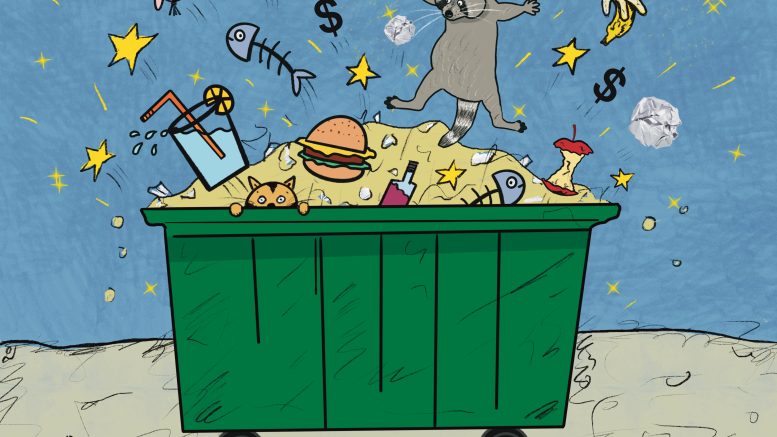In this economy, the discarded microwaves and half-eaten red velvet cakes in my apartment complex’s dumpster are their own sweet temptations. However, I am defiant in private and a pathetic rule-follower in public. I can’t bring myself to take anything.
Under Winnipeg bylaws, scavenging or picking through garbage bins that you don’t own is prohibited. Similarly, Winnipeg disallows rifling through garbage at designated waste disposal sites.
Obviously, this bylaw is not strictly enforced. Anyone who has set foot in Winnipeg has seen someone picking through a garbage bin. Even so, think about what it means for restrictions like these to exist in Winnipeg’s bylaws.
Presumably, if something is in a trash bin, the person who owns the bin doesn’t care about it anymore. Laws about picking through trash display a strain of militant selfishness in the culture of this city, where we have a possessive need to feel in control of even our garbage until it’s out of sight and mind.
But what is even more revealing about these bylaws protecting garbage is that they show we are fully aware we’re throwing things away that are usable. People pick through garbage because, amidst rotten food and unnervingly browned articles of clothing, there is something of value to them there. Rather than ban throwing away usable things, the city has prohibited people salvaging usable things.
Divers have long reported being hassled about the activity at times. For poor Winnipeggers, dumpster diving is an important supplement to other ways of collecting income, according to one Edmonton social survey.
In some Canadian municipalities, dumpster diving is becoming more and more necessary as grocery prices skyrocket. If Toronto can allow dumpster diving without falling apart, Winnipeg can too.
There are also communities of people around the world who dumpster dive not out of necessity, but for a range of other reasons. Some do it to save money, while others dive to try to divert waste from landfills that their municipal waste systems don’t bother to catch.
Instagram account @nyctrashtotreasures will salvage furniture, decorations and other objects that are not yet at the end of their lives and refurbish them for resale.
Anna Sacks, also known as TheTrashWalker on TikTok, posts videos of the trash turned treasures that she rescues from New York’s curbside. Her videos show bags of edible food, working electronics, unused notebooks and tableware.
Businesses should not be chucking food out. Never mind food that’s close to expiry — and compostable at that. Most food should be donated before it’s wasted.
The knee-jerk response from insufferable twits who don’t Google the first thoughts their creativity starved minds can produce is that someone could get sick from businesses’ food donations. In that case, the donors would be liable, then they would be mired in lawsuits and the stock market would explode.
But this is completely wrong. In Canada, food donors have extensive protections against civil liability in the event that someone eats spoiled donated food. The same is true in the United States.
Back in 2021, one grocery store in Oregon discarded literal tons of edible food during a power outage, and stationed police by the dumpster so people couldn’t scavenge any of it. In light of the fact that the food could have been donated at no risk to the business, the incident became representative of the vile, poisonous corporate laziness permeating the food industry’s approach to waste prevention.
The issue of corporate waste is distressing. In Canada, the amount of food wasted during the processing and manufacturing of food could feed every Canadian for five months. Grocery stores alone are responsible for 1.31 billion tonnes of food waste annually in Canada.
Residential garbage tells a story too. Individuals are not informed about the proper ways to dispose of their waste. Electronics cannot be taken to the landfill, they need to be taken to an e-waste centre. I know from speaking to people in my community that many people are honestly ignorant of this, and those who aren’t do not have time or the means to cart their dead vacuum to Urban Mine.
Most of us assume that our waste system functions rationally, and that those in power would not seriously allow our embarrassing waste system to work the way it does. I believe things like used TVs end up in residential waste because people naively believe the government takes care of it.
For this reason, dumpster divers are heroes.
There are people who dive out of necessity, and it’s not okay that they have to do that. I’m not celebrating the desperation of people who have no option but to dumpster dive. Whether they do it out of need or because they just find it fun, people who dumpster dive are diverting waste from the landfill because there are fundamental flaws with the way stuff is produced and discarded in this world, and dumpster divers — both the hobbyists and the necessities — are filling in until a better system is developed.
It shouldn’t be up to us to sift through garbage, the garbage shouldn’t be there in the first place. But if the City of Winnipeg won’t do the bare minimum and update its waste infrastructure, then the very least that it should do is free the dumpsters.



